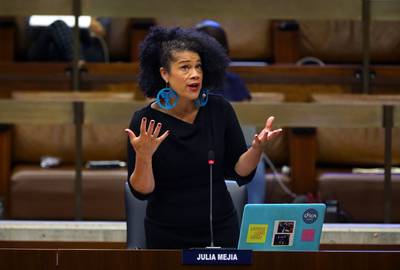This story was produced in partnership with WBUR. WBUR’s investigations team is uncovering stories of abuse, fraud and wrongdoing across Boston, Massachusetts and New England. Get their latest reports in your inbox. This story was supported by the Pulitzer Center.
Boston city councilors are calling for a review of the city Police Department’s purchase of controversial surveillance technology, after an investigation by WBUR and ProPublica revealed the transaction, which had been hidden from public view.
Councilor At-Large Julia Mejia said the Boston Police Department should stop using its cell site simulator, or “stingray,” which can track real-time cell phone location, until a public hearing can be held to learn more about the use of the device and how it was purchased. Critics have suggested the technology could threaten constitutional rights, and members of Congress have called for measures to restrain its use.
“There needs to be a hearing order around this so that we can get things on the record and have a better understanding” of what the BPD’s “process was and how they got here in terms of accountability and transparency,” Mejia said.
The cell site simulator, purchased by Boston police in 2019, acts like a commercial cell phone tower, tricking nearby phones into connecting to it. Once a phone has connected to the simulator’s decoy signal, the equipment secretly obtains a user’s location and other information that can potentially be used to identify them.
Credit:
Pat Greenhouse/The Boston Globe via Getty Images
Boston police spokesperson Sgt. Detective John Boyle pushed back, saying in a statement that “discontinuing the use of the cell site simulator would immediately impact the Department’s ability to provide deserved and required public safety to the citizens of Boston.”
Boyle previously confirmed that when the device is used to find suspects and missing people, it can also scoop up data from other phones in the area. Boyle told WBUR that this information is “discarded,” though there is no way for the news organization to verify that.
Julian Sanchez, a senior fellow at the libertarian think tank the Cato Institute, has studied cell site simulators and their use by local law enforcement. He said the BPD’s hidden purchase of the technology follows a pattern he’s seen in other parts of the country.
“Very often police departments try to keep this technology under wraps,” he said, because “if local political authorities are aware of the nature of the incredibly intrusive technologies and methods,” then “they may well want to establish rules.”
Boyle said Boston police are required to obtain a warrant before using the cell site simulator in criminal investigations, but that’s not the case in emergency or “exigent” situations, where there’s a risk of death or bodily harm. Since 2017, Boyle said, BPD has used this and similar technology 98 times. Forty-one of those instances were deemed to be exigent cases where a warrant wasn’t necessary, he said.
The equipment purchased by the BPD has been invisible to the public in part because of how it was paid for. The police used money from civil asset forfeiture — a system of keeping money that has been seized from people in connection with suspected crimes, typically drug investigations. Even if no charges are filed, law enforcement can keep the money, and in Massachusetts, police chiefs have broad discretion over how the funds are spent.
Boston City Councilor Andrea Campbell said in a statement that she was not aware of the BPD’s purchase of surveillance equipment in 2019 until WBUR brought it to light.
“Very little is known about how our police department spends civil forfeiture funds,” she said. “We need greater transparency and oversight and an appropriate public process.”
Credit:
Jesse Costa/WBUR
Campbell said she’d also like to see Boston Mayor Michelle Wu establish a new system requiring more city supervision over the use of forfeiture funds.
An ordinance passed in October will require city departments, including Boston police, to get approval from the city council before purchasing surveillance equipment. In a statement, Wu said she will oversee the implementation of the new regulations.
“The Surveillance Oversight legislation that the Boston City Council passed will create safeguards to ensure needed oversight, accountability and transparency over the use of surveillance technology across all City departments,” Wu said in the statement.
According to the mayor’s office, the new ordinance will place scrutiny on any future efforts to use forfeiture funds to buy surveillance equipment.
Rachel Levinson-Waldman, a deputy director at the New York-based Brennan Center for Justice and a specialist on policing and technology, said it’s important for citizens and city officials to have a say in where police devote resources. This spending should not be done in secret, she said.
“It’s just so antithetical to the notion of public transparency and being able to understand what this money is being spent on,” Levinson-Waldman said, “and what surveillance technologies are ending up in the hands of law enforcement.”


